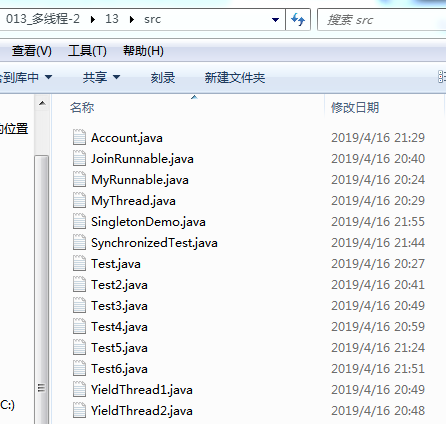### 线程调度 - 线程休眠 休眠是指让当前线程暂停执行,从运行状态进入阻塞状态,将 CPU 资源让给其他线程的一种调度方式。 sleep() - 线程合并 合并是指将指定的某个线程合并到当前线程中,将原本两个交替执行的线程改为顺序执行,即一个线程执行完毕之后再来执行第二个线程,通过调用线程的 join 方法来实现合并。 假设有两个线程:线程A和线程B,线程A在执行到某个时间点时,调用线程B的join方法,则表示从当前的时间节点开始,CPU资源被线程B独占,线程A进入阻塞状态,等待获取CPU资源进入运行状态。 - 线程礼让 在某一个时间节点,线程暂停争夺CPU资源,进入阻塞状态,但只是暂时的一瞬间,过后线程对象再次进入就绪状态来争夺CPU资源,yield 实现线程礼让。 - 线程中断 1、线程执行完毕之后自动停止。 2、线程在执行过程中出现错误停止。 3、线程在执行过程中手动停止。 - public void stop() - public void interrupt() - public boolean isInterrupt() ### 线程同步 可以通过 synchronized 修饰方法来实现线程同步,每个 Java 对象都有一个内置锁,内置锁会保护使用 synchronized 关键字修饰的方法,要调用该方法就必须先获得内置锁,否则就处于阻塞状态。 ### 线程安全的单例模式 单例是一种常见的软件设计模式,其核心思想是一个类只能有一个实例对象,由多个线程来共享该实例对象的资源。 ```java public class SingletonDemo { private static SingletonDemo instance; private SingletonDemo() { System.out.println("创建单例对象"); } public static SingletonDemo getInstance() { synchronized (SingletonDemo.class) { if(instance == null) { instance = new SingletonDemo(); } } return instance; } } ```

Account.java
public class Account implements Runnable { private static int num; @Override public synchronized void run() { // TODO Auto-generated method stub try { Thread.currentThread().sleep(1); } catch (InterruptedException e) { // TODO Auto-generated catch block e.printStackTrace(); } num++; System.out.println(Thread.currentThread().getName()+"是当前第"+num+"位访客"); } }
JoinRunnable.java
public class JoinRunnable implements Runnable { @Override public void run() { // TODO Auto-generated method stub for(int i = 0; i < 200;i++) { System.out.println(i+"---------JoinRunnable"); } } }
MyRunnable.java
public class MyRunnable implements Runnable { @Override public void run() { // TODO Auto-generated method stub for(int i = 0; i < 100; i++) { try { Thread.currentThread().sleep(3000); } catch (InterruptedException e) { // TODO Auto-generated catch block e.printStackTrace(); } System.out.println("------MyRunnable"); } } }
MyThread.java
public class MyThread extends Thread { @Override public void run() { // TODO Auto-generated method stub for(int i = 0; i < 100;i++) { try { Thread.sleep(1000); } catch (InterruptedException e) { // TODO Auto-generated catch block e.printStackTrace(); } System.out.println("------Thread"); } } }
SingletonDemo.java
public class SingletonDemo { private static SingletonDemo instance; private SingletonDemo() { System.out.println("创建单例对象"); } public static SingletonDemo getInstance() { synchronized (SingletonDemo.class) { if(instance == null) { instance = new SingletonDemo(); } } return instance; } }
SynchronizedTest.java
public class SynchronizedTest { public static void main(String[] args) { for(int i = 0;i<5;i++) { Thread thread = new Thread(new Runnable() { @Override public void run() { // TODO Auto-generated method stub SynchronizedTest synchronizedTest = new SynchronizedTest(); synchronizedTest.test(); } }); thread.start(); } } public void test() { synchronized (SynchronizedTest.class) { System.out.println("start..."); try { Thread.currentThread().sleep(1000); } catch (InterruptedException e) { // TODO Auto-generated catch block e.printStackTrace(); } System.out.println("end..."); } } }
Test.java
public class Test { public static void main(String[] args) { // MyRunnable myRunnable = new MyRunnable(); // Thread thread = new Thread(myRunnable); // thread.start(); MyThread myThread = new MyThread(); myThread.start(); } }
Test2.java
public class Test2 { public static void main(String[] args) { JoinRunnable joinRunnable = new JoinRunnable(); Thread thread = new Thread(joinRunnable); thread.start(); for(int i = 0;i<500;i++) { if(i == 10) { try { thread.join(500); } catch (InterruptedException e) { // TODO Auto-generated catch block e.printStackTrace(); } } System.out.println(i+"+++++++++main"); } } }
Test3.java
public class Test3 { public static void main(String[] args) { YieldThread1 thread1 = new YieldThread1(); thread1.setName("Thread1"); YieldThread2 thread2 = new YieldThread2(); thread2.setName("Thread2"); thread1.start(); thread2.start(); } }
Test4.java
public class Test4 { public static void main(String[] args) { Thread thread = new Thread(new Runnable() { @Override public void run() { // TODO Auto-generated method stub for(int i = 0; i < 10;i++) { if(i == 5) { Thread.currentThread().interrupt(); } System.out.println("------Test"); } } }); thread.start(); System.out.println(thread.getState()); System.out.println(thread.isInterrupted()); System.out.println(thread.getState()); } }
Test5.java
public class Test5 { public static void main(String[] args) { Account account = new Account(); Thread t1 = new Thread(account,"线程A"); Thread t2 = new Thread(account,"线程B"); t1.start(); t2.start(); } }
Test6.java
public class Test6 { public static void main(String[] args) { Thread thread = new Thread(new Runnable() { @Override public void run() { // TODO Auto-generated method stub SingletonDemo singletonDemo = SingletonDemo.getInstance(); } }); thread.start(); Thread thread2 = new Thread(new Runnable() { @Override public void run() { // TODO Auto-generated method stub SingletonDemo singletonDemo = SingletonDemo.getInstance(); } }); thread2.start(); } }
YieldThread1.java
public class YieldThread1 extends Thread { @Override public void run() { // TODO Auto-generated method stub for(int i = 0; i < 10; i++) { if(i == 5) { yield(); } System.out.println(getName()+"------"+i); } } }
YieldThread2.java
public class YieldThread2 extends Thread { @Override public void run() { // TODO Auto-generated method stub for(int i = 0; i < 10;i++) { System.out.println(getName()+"------"+i); } } }